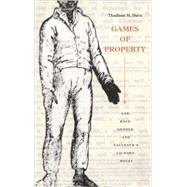Games of Property
, by Davis, Thadious M.- ISBN: 9780822331391 | 082233139X
- Cover: Paperback
- Copyright: 7/1/2003
In Games of Property, distinguished critic Thadious M. Davis provides a dazzling set of readings of William Faulkner's Go Down, Moses - sometimes characterized as a novel, sometimes as a collection of stories-that offers a deep understanding of the interrelationship between the treatment of persons as property and the perception of laws, social forms, and rituals as games. She argues that the book, published in 1942, ranks among Faulkner's finest and most accomplished works. Linking it to Dred Scott and a host of other legal cases, she shows how the law permeates Go Down, Moses, and, in so doing, she simultaneously enriches interpretations of Faulkner's fiction and understandings of the power and scope of property law.The stories in Go Down, Moses span from the 1830s into the 1940s-the period during which enslaved persons went from being defined as property to being freed persons and citizens under the Thirteenth, Fourteenth, and Fifteenth Amendments to the Constitution. Games of Property reveals how the tensions inherent in ideas of persons as property that polluted the pre-Civil War republic persisted into Reconstruction and beyond, into Faulkner's lifetime and the present day.Davis brings together law, social history, game theory, feminist critiques, and biographical information about Faulkner's life in a unique interpretation of one of the famous writer's most enigmatic works. Pointing out that Go Down, Moses is unified by games - fox hunting, gambling with cards and dice, racing - and that games, like the law, are rule-dependent forms of social control and commentary, she illuminates a dual focus within the book: on property and ownership on the one hand and on masculinist sport and social ritual on the other. In a daring move, she situtates Tomey's Turl, the stereotyped slave who appears as an actor only in the wildly slapstick opening story, "Was," at the center of her reading and as an active, disruptive, and importantly creative force within Go Down, Moses.






